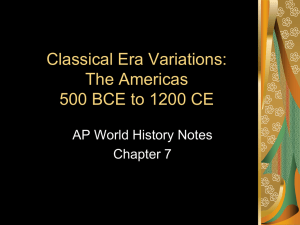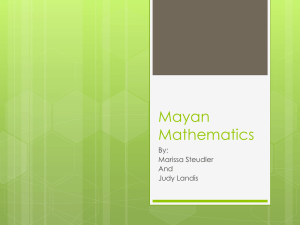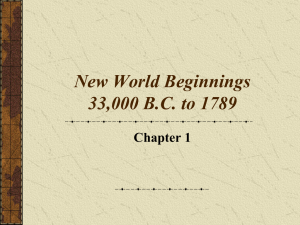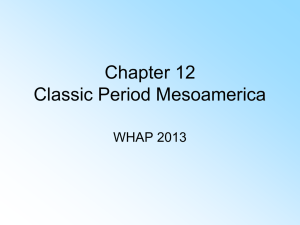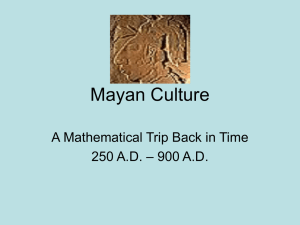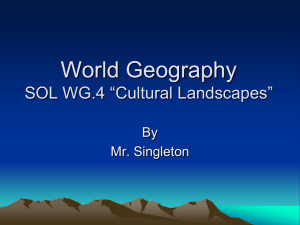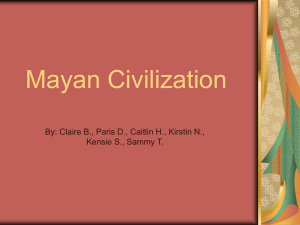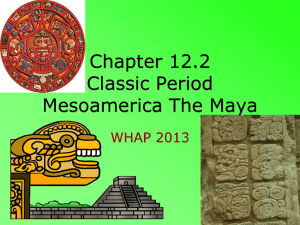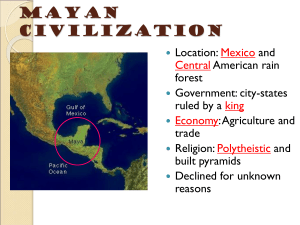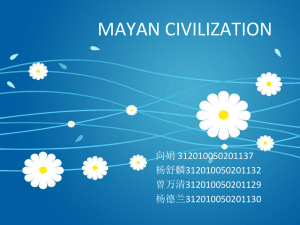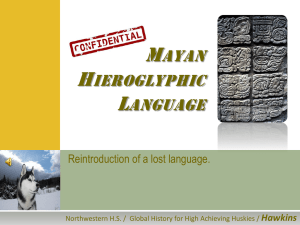reampedmayans
advertisement
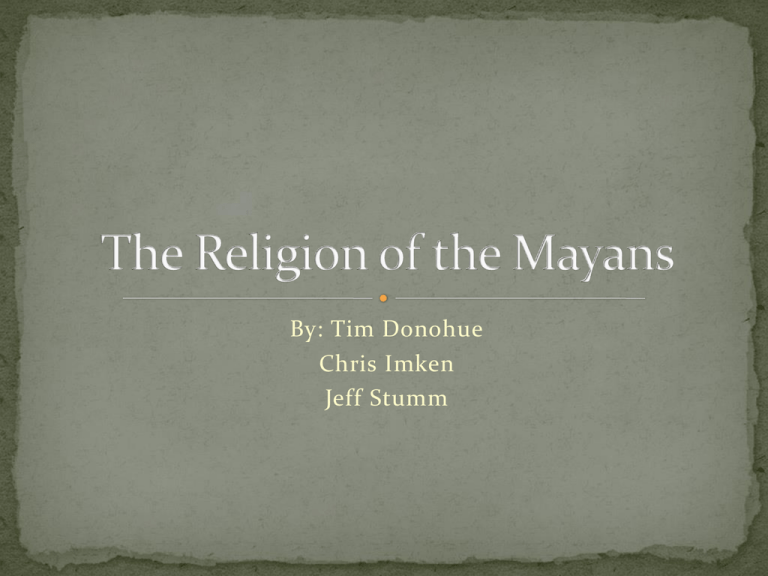
By: Tim Donohue Chris Imken Jeff Stumm Very advanced civilization Developed a written language and calendar Popol Vuh Cosmos and nature were very important Religion developed around those practices Large City States – largest was Teotihuacan Polytheistic religion Broken up into the earth, sky, moon, sun, caves, and the mountains The cosmos affected their ritual cycles Mountains were viewed as animated beings The Mayan people divided the earth and sky into four different sections Each direction was associated with its’ own color and society was built upon this belief of the four directions They protected and watched over the people, and all kings would become divine ancestors when they died Were seen to give spiritual guidance and protection to their people Rituals were the last major belief in the Mayan community Each god was associated with a specific task For example, Itzamma was the creator and patron of knowledge Important celestial bodies (sun, moon) were a major and important group of deities Another group of gods were associated with the natural world such as crop production and rain The last major group were the patrons of various social and occupational groups Ek Chuah was the god of merchants and cacao producers The Mayan’s believed that Gods were like any other human being living on earth. They need to be nourished, cured of imperfections and capable of faults (Wolfgang von Hagen 1961: 357-58). To please and pray to the gods, The Mayan’s offered human sacrifices to them. Human sacrifice was used in times of trouble, prayer, or celebration. The Mayan’s mainly used three different types of sacrifices to please the gods. The three types are the Arrow Ceremony, the heart rendering ceremony, and blood sacrifices. In this sacrifice, the victim, The next practice was to usually a prisoner of war, would be tied in a crucifix fashion to a wooden frame high off the ground. A Mayan priest would then wound the victim in their place of shame, usually the genitals, and the blood that dripped was smeared onto a nearby idol. have a set of dancers with arrows come in and symbolically dance around the victim. After the dance, they would then stand in front of the victim and shoot arrows in a way that “would make the whole chest look like a hedgehog of arrows (Wolfgang von Hagen 1961: 358).” In this ceremony, the As the arms and legs were victim would be placed spread eagle over a sacrificial stone in a way that would arch the chest for exposure of the heart. The victim’s arms and legs be held down by “chacs” or priests in the Mayan religion. being held, another priest would drag a flint knife across the chest of the victim, exposing the heart. The final process is the “the arm of God would plunge into the heart and seized the heart like a raging tiger and snatched it out alive (Wolfgang von Hagen 1961: 358).” The final type of Sacrifice was the Blood Ceremony. Blood in the Mayan religion was believed to express vital principles even outside the body. They believed it processed magical powers that were pleasing to the Gods. Victims blood usually came from the genitals of Males because it was especially pleasing to the Gods. In the 1500s, the Mayans were conquered and oppressed by the Spaniards Spaniards were devout Catholics and did not tolerate other religions In order to survive, the Mayan religion adapted and took on some Catholic principles Catholic beliefs were incorporated into the Mayan religion Important Catholic figures such as the saints, Jesus, Mary, and God were incorporated “Cofradias” – serve the saints Old Mayan Beliefs Syncretinized Beliefs Sun god = Kinich Ahau Sun god = God, or more Moon = Ix Chel frequently Christ Moon = Mary, the Virgin Mother Saints are the guardians of field, hearth, and heart Spirits and lesser deities were the guardians of field, hearth, and heart A mixed religion in Guatemala that mixes earthen lords, Jesus, saints, and ancestors Many ancient rituals and beliefs have been dropped, and new Catholic ones developed Still have some of old pure Mayan beliefs The “Monkeys” Although Catholicism has exerted a strong influence, Mayans still maintain there identity Strong Native nationalism movements developed Still maintain important beliefs not changed by Catholicism The concept of the soul is drastically different from the Catholic Perspective Wolfgang von Hagen, V. (1961). The Ancient Sun Kingdoms of the America’s. Cleveland, Ohio, USA: The World Publishing Company.
